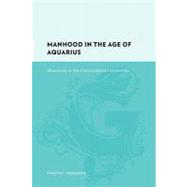
Note: Supplemental materials are not guaranteed with Rental or Used book purchases.
Purchase Benefits
Looking to rent a book? Rent Manhood in the Age of Aquarius [ISBN: 9780231135443] for the semester, quarter, and short term or search our site for other textbooks by Hodgdon, Tim. Renting a textbook can save you up to 90% from the cost of buying.
| Acknowledgments | p. xi |
| Preface | p. xv |
| Abbreviations | p. xxi |
| Introduction | p. xxiii |
| "Style, Guile, Balls, Imagination, and Autonomy": The Anarchist Masculinity of the Diggers and Free Families | p. 1 |
| Origins: The Diggers, the Haight-Ashbury, and Hip Identity | p. 3 |
| Personal Heaviness: Defining and Defending Countercultural Masculinity in the Haight-Ashbury | p. 38 |
| Brothers and Rivals, Stud Peacocks and Earth Mothers: Gender Relations among the Digger Heavies | p. 62 |
| "We Be Yogis and Yoginis Together in Our Families": Tantric Masculinity on The Farm | p. 99 |
| "I Used To Believe in Hemingway": The Self-Making of a Haight-Ashbury Spiritual Teacher | p. 101 |
| "We Here Work as Hard as We Can": The Farm's Sexual Division of Labor | p. 136 |
| "Like a Good Horse Follows a Rider": Shaping Tantric Manhood in Marriage, Sexuality, and Childbirth | p. 171 |
| Bibliography | p. 205 |
| Table of Contents provided by Ingram. All Rights Reserved. |
The New copy of this book will include any supplemental materials advertised. Please check the title of the book to determine if it should include any access cards, study guides, lab manuals, CDs, etc.
The Used, Rental and eBook copies of this book are not guaranteed to include any supplemental materials. Typically, only the book itself is included. This is true even if the title states it includes any access cards, study guides, lab manuals, CDs, etc.